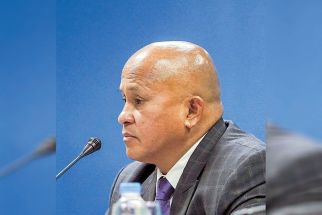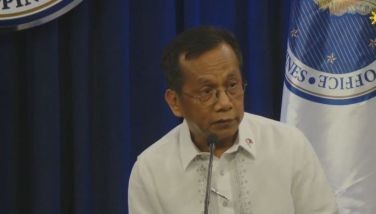Poll machines pass 2nd round of tests
MANILA, Philippines - Automated elections nationwide will be held as scheduled on Monday, the Commission on Elections (Comelec) said yesterday with renewed optimism after the machines passed a second round of tests.
Comelec Chairman Jose Melo said compact flash cards will be distributed by Saturday to 95 percent of the clustered precincts throughout the country.
“In case there would be precincts in very, very remote areas without compact flash cards or if they do not arrive on time, voters will still go and vote, and their ballots will be deposited in ballot boxes and, on election day itself or the day after the flash cards arrive and (are) tested, the ballots will then be fed for counting,” he said.
Results of testing of PCOS machines, particularly in Metro Manila, showed a 100 percent match of manual and machine counting of votes, he added.
Melo said manual counting of votes would be held only in small municipalities, in case a machine would malfunction and a spare one is not immediately available.
Only the canvassing of votes in about 320 polling precincts nationwide – in some municipalities in Negros Occidental, Isabela, Basilan, Cagayan, Maguindanao, Palawan, Sulu, Tawi-Tawi, Zamboanga del Sur, Lanao del Norte, Lanao del Sur, Misamis Occidental, Surigao del Norte and Surigao del Sur – might be delayed for a few hours or a day due to the late arrival of the flash cards, Melo said.
“All will be able to vote but counting may be done on the night of election day or the next day.”
As of yesterday, flashcards have been dispatched to Bohol, Guimaras, Abra, Capiz, Batanes, Quirino, Parañaque, Marikina, Batangas and Palawan, according to Cezar Flores, Smartmatic spokesman.
The Bureau of Customs (BOC) is fast-tracking the entry of the new compact flashcards for the counting machines.
Customs Commissioner Napoleon Morales said his office has been coordinating closely with Comelec Commissioner Gregorio Larrazabal on all their shipping needs.
At Malacañang, presidential spokesman Ricardo Saludo denied reports that Mrs. Arroyo and her key security officials had discussed the possibility of a failure of elections.
“I don’t recall any such scenario,” he said.
Saludo said the administration’s focus has always been on how to help the Comelec conduct honest, orderly and peaceful elections.
Macalintal: Selective poll delay illegal
Election lawyer Romulo Macalintal warned the Comelec yesterday that selective postponement of the May 10 elections is against the Constitution.
“Under the law, it should be synchronized. Otherwise, it will only be a source for graft and corruption.”
“We don’t even know what will happen next now that they have not even tried the transmission (mode) yet.
Macalintal said postponing the elections in some areas will open the gates to more fraud.
“The tail-enders will go to these places and they will try their very best to manipulate the results of the elections.”
Comelec, Smartmatic officials no-show
Officials of the Comelec and Smartmatic did not appear at the installation of the Consolidation and Canvassing System (CCS) that will count the votes for president at the House of Representatives.
Speaking to reporters yesterday, Bayan Muna Rep. Teddy Casiño said House Secretary General Marilyn Yap had to speak on their behalf.
“Their (Comelec and Smartmatic executives) absence is a major insult to the House,” he said.
“They think our questions do not matter.”
Casiño said Smartmatic sent a technician who could not answer questions.
The equipment was placed at the session hall near the podium, Casiño told reporters.
Only authorized personnel will be allowed around the area, which will be secured until the canvassing of votes starts.
Staff members of the House and Senate secretaries general attended the installation of the CCS server, comprising a Dell laptop, a printer and a generator, which can be used in the event of a power outage.
Yap told Casiño and Rep. Neri Colmenares that results not electronically transmitted will be entered into the CCS manually.
The same would be done with overseas absentee voting results.
“The turnover by Comelec and Smartmatic to the House was a mess,” he said.
“Can you imagine, they were using the guidelines for provincial canvassing as they were installing the CCS for the presidential canvassing. It’s like a joke to the Comelec.”
Yap told Colmenares and Casiño that only those who know the password can open the CCS to access the transmitted results.
Casiño said he noticed that security keys to be used for passwords and usernames came from an open envelope, wrapped in ordinary paper and not even sealed.
“Anyone who could have accessed the security tokens in the unsealed envelope and read the passwords written on a piece of paper could now enter fake results in the CCS.”
Colmenares said a losing presidential candidate can now question these results and create havoc in the presidential canvassing.
“The fact that the envelopes were open is a major fiasco,” he said.
Colmenares said House members were informed that results of the overseas absentee voting will be physically transmitted through memory cards.
“Waiting for the results from countries abroad will surely cause delay in the canvassing,” he said.
“It is possible that we will be canvassing the results for more than 48 hours. Moreover, it is difficult for poor party-list candidates like Bayan Muna who cannot afford watchers to guard the memory cards all the way to the Philippines.”
Casiño said the installation of the CCS was a failure.
“The card or flash reader was not tested if it could read information, or if it would accept flashcards physically transmitted.
“There was even no testing of electronic transmission. Bayan Muna will file a protest with the Comelec on these dangerous developments.”
Casiño said the testing of the server was a big disappointment.
“No complete testing was done on the capability to receive transmissions or read physically transmitted results,” he said.
“Overall, the test did not inspire confidence in the CCS.”
Sotto: Give modernization a chance
Nationalist People’s Coalition senatorial candidate Vicente Sotto III called yesterday on the country’s leaders and the public to give election modernization a chance.
Sotto told The STAR people should not worry as long as the problems with the PCOS can be solved in time.
“A parallel manual count will create confusion and (is) subject to manipulation,” he said.
A manual count should only be allowed in areas where the counting machines would falter, Sotto said.
Bagumbayan standard-bearer Sen. Richard Gordon called yesterday on the Comelec to ensure that the PCOS machines will work on election day.
“Failure is not an option,” he said.
“Focus and get to work. If it is necessary to move the election date by a week to ensure reliability of the machines, then do it. Work on the solution.”
Gordon said the Comelec must not panic as problems in any project tend to crop up at the last minute.
“These are tough decisions but they have to be made,” he said.
Watchdogs: Support Comelec
Election watchdogs called yesterday on the public to support the Comelec for the country’s first automated elections to be successful.
Task Force 2010, a group of various election watchdogs, asked voters to defend and uphold their right of suffrage.
“Let us not be intimidated or be afraid to engage in the first automated synchronized national and local elections,” said Bro. Joseph Raymund Patrick Sanches, executive director of Simbahang Lingkod Bayan, one of the 19 member-organizations of Task Force 2010.
“Let us not allow setbacks to discourage us from exercising our right. Instead, let these be the litmus test of our commitment to our democracy and our resolve to vote conscientiously as our concrete way of defending our democracy.”
Recto: Manual counting in local polls
Liberal Party senatorial candidate Ralph Recto proposed yesterday the manual counting of votes in local elections.
“Comelec should have at least a backup plan to avoid a failure of elections in the event that the PCOS machines develop a severe reading disorder,” he said.
Recto said the glitches in the PCOS machines might affect only the counting of votes.
“With only few days to go before the elections, Comelec should immediately come up with a solution,” he said.
“Time is running out and the task at hand seems to be overwhelming.”
He said in Batangas where the ballots’ backside was misread, this problem can be corrected in a parallel manual count.
“I am under the impression that the PCOS machines misread only the backside of the ballot, where local candidates are listed,” he said.
“But in the national positions, there seems to be no problem. So what the Comelec can do is implement a sort of hybrid polls.
“It can even automate the counting of votes for all positions but conduct a parallel manual count for the local ones.”
Recto said a parallel manual count of votes would solve most of the problems being encountered by Comelec and Smartmatic-TIM.
“Everything else would just be a band-aid solution to the problem at hand. But an across-the-board parallel manual count of the votes in all positions would be a catch-all method of responding to the failure of the machines,” he said. — Marvin Sy, Delon Porcalla, Paolo Romero, Michael Punongbayan, Iris Gonzales, Helen Flores, Mike Frialde
- Latest
- Trending




























